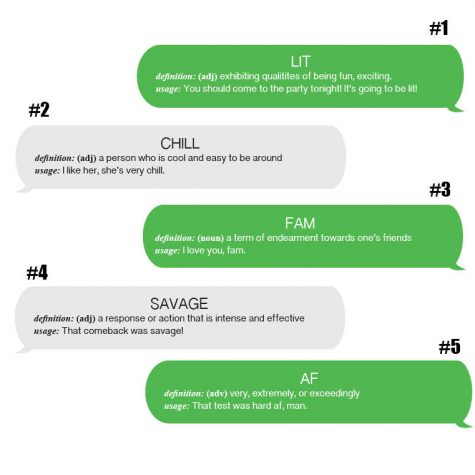Slang: Shortened language expands casual vocabulary
January 22, 2017

Infographic: Mari Knudson and Iya Abdulkarim
“Yas, queen. Slay.”
“It’s gonna be lit.”
“What an aesthetic!”
“Whoa, that was savage.”
Just like chokers, words go in and out of style. But why do we grow so attached to certain words or phrases? What makes slang such an important part of our daily communication?
“Slang, it’s an identifier language in many ways,” said English teacher Randall Findlay.
“It’s a way a lot of people establish… a group culture. If you were to move into another group of people, they would use different slang words. It’s a barrier of sorts,” said junior Sabrina Rucker. “If you know what the current slang is, then you can use it effectively. There’s a status part of it.”
The popularity of some words can be exponential, according to junior J.J. Wertkin.
“[Students are] influenced by their classmates. When one person starts a new and catchy slang word, everyone starts to use it,” said Wertkin.
While slang has become increasingly more common in the past few years through social media and other methods of online communication, it also has managed to slip into our everyday conversations.
“I think that slang always slips into classroom vocabulary,” said English teacher Adrienne Baker.
The use of slang in more formal settings is often a slipup due to convenience. While a handy tool for casual conversation, it is often viewed as an issue in classroom settings.
I think that slang always slips into classroom vocabulary.
— US English Teacher Adrienne Baker
“There’s a thought of how to get an idea across as quickly as possible, and writing is a craft that takes a lot of time and practice… I think more than anything, it’s just another layer of cognitive thinking that needs to happen [during the writing process],” Baker said. “It might be useful to write out a first draft with a lot of conversational language and colloquialisms but to then go back and edit it out, or to formalize it as one goes” Baker said.
While most common amongst students, the use of slang can affect how we communicate with our teachers as well. However, using trendy words in conversations with teachers is often frowned upon.
“When you’re emailing a teacher, you’re not going to treat them like your comrade. That’s just not how you treat teachers – it’s a sign of respect. If you’re going to send them an email with slang, it would be an email as a friend and not as a student,” said Rucker.
But will trendy words and slang affect students’ abilities to communicate professionally?
“[Slang is] used for more casual talk. So, people are now becoming more and more casual with each other,” said junior J.J. Wertkin.
“Using slang often might affect students’ ability to communicate professionally or academically,” said sophomore Jane Brunell, “if students fall into the habit of using it, they wouldn’t know how to effectively talk to adults or other peers.”